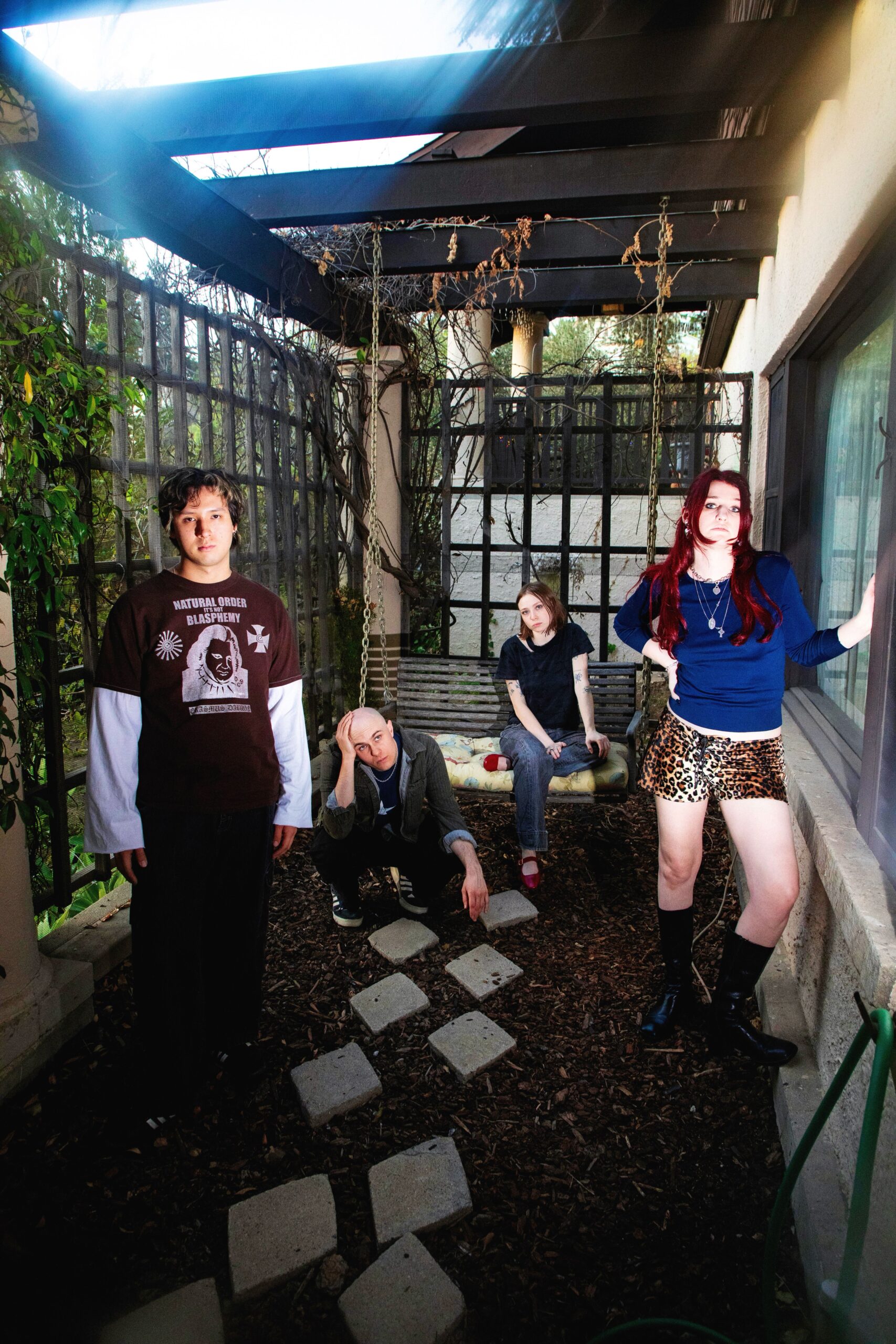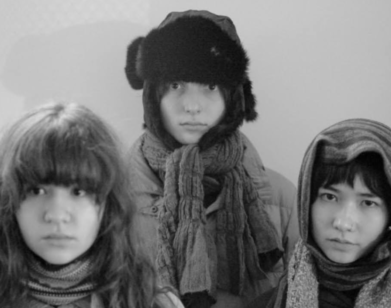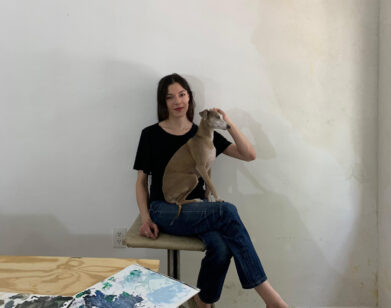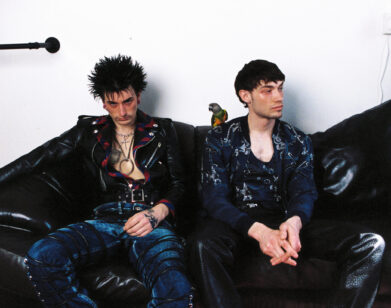BANDMATES
Momma on Breakups, Sisterhood, and the Indie Rock Renaissance
Household Name turned Momma into indie rock’s new, well, household name. On their 2022 breakthrough album, core songwriters Etta Friedman and Allegra Weingarten drew from the likes of ‘90s luminaries such as Pavement and Stephen Malkmus’ alleged diss recipient Smashing Pumpkins, updating a decades-old sound for the modern age. In a sheer bout of irony that’d make Malkmus himself proud, someone from Momma had to sell their tickets to see Pavement at Brooklyn Steel because they were now opening the show.
On the heels of that full-circle opening slot, the Brooklynites spent the ensuing years touring with Death Cab for Cutie, Modest Mouse, Weezer, and Alex G. But they’re the opening act no more, now preparing to play some of the biggest venues of their career as the marquee act, including a sold-out stop at New York’s Warsaw. During my Zoom conversation with Weingarten and Friedman, the latter reminisced on how the two of them once dreamt about someday performing at Coachella. Now, their music has taken them to Indio.
Their fourth record, Welcome to My Blue Sky, brims with towering hooks and thick guitar riffs. Standout tracks like “I Want You (Fever),” “Rodeo,” and “Last Kiss” adopt the bigger-and-bolder-sequel approach, outfitting the already infectious songwriting of its predecessor with even greater panache. Back in January, I had the chance to talk to Weingarten and Friedman about the making of Welcome to My Blue Sky, what they learned from touring with some of the biggest artists in indie rock, and what they enjoy most about being in a band together.
———
GRANT SHARPLES: Hi, how’s it going?
ALLEGRA WEINGARTEN: Good. How are you?
SHARPLES: Good. It looks like Etta is joining us, too. Hi, Etta.
WEINGARTEN: You’re muted, Etta.
ETTA FRIEDMAN: I said, first of all, “Thanks for saying that,” and second, “Hi, what’s up?”
SHARPLES: Hi! Thank you guys for talking to me about Welcome To My Blue Sky, which is being announced next week. Is that correct?
FRIEDMAN: Yeah.
WEINGARTEN: On the 29th.
SHARPLES: Are you excited for it to be out in the world?
FRIEDMAN: For sure. We’ve been sitting on this one for so long.
SHARPLES: What was the timeline like?
WEINGARTEN: We had demos. We started writing right after Household Name, during the winter of 2022, but I don’t think we started writing songs that ended up on the record until early 2023. Right, Etta?
FRIEDMAN: Yeah.
WEINGARTEN: From when it’s released, these songs will have existed in the world for two years.
SHARPLES: Wow. Household Name, funny enough from its title alone, put you on the map. How does it feel at the start of this album cycle to know that there are a lot more eyes and ears on you?
FRIEDMAN: It’s an entirely different feeling this time. The last record was our first time working at a larger level, and it was all insane and crazy and exciting. I’m happy to be more mentally prepared for this album. Being able to know what’s going to come your way is helpful.
WEINGARTEN: Also knowing that people are already familiar with us and are waiting for new stuff creates confidence. With Household Name, we thought a lot about what the response would be and what the listener’s experience would be. This time around it was like, what do we want? What kind of songs do we want to write? And if we think it’s good, people will like it.
FRIEDMAN: Absolutely.
SHARPLES: Also, random, but I like the System of a Down sweatshirt.
WEINGARTEN: Oh, yes.
SHARPLES: You got to tour with a lot of big indie rock names, with everyone from Death Cab [for Cutie] to Modest Mouse and Weezer. Was there anything that you took away from those experiences, performing for bigger audiences?
WEINGARTEN: On the more technical side, we took a lot of notes. We saw bigger bands that have in-ears and have front of house people and a crew. Also learning how you can make touring sustainable for a long time. We have picked a lot of brains about how to do this for a living and not completely get depressed and exhausted.
FRIEDMAN: What’s been interesting on the technical side is seeing what people prioritize on tour, especially artists that are larger, but haven’t been around for 30 years. Death Cab and Weezer are so professional and locked in. Everything is really planned out, and they get people doing what they need, and their lives are made a lot easier. Obviously, they had more time to build that up. But there’s certain people who don’t need a monitors person. There isn’t one cut and dry way to go about it. It’s truly about what your priorities are and what you can afford.
SHARPLES: Since you first started this band, and since Household Name, how do you feel like your musicianship and your songwriting have changed?
WEINGARTEN: We did a lot more writing together on this upcoming record. We recognized that the content was going to be a lot more personal, so the writing sessions were slightly different because it was mainly Etta and I writing together on acoustic guitars, and then bringing it to Aron [Kobayashi Ritch] to demo and figure out what the song would sound like. Household Name was more of a full band thing. The songs sound different, they sound more like a band jamming. Welcome to My Blue Sky is a little more introspective and a little softer. We’ve gotten good at trusting our initial ideas and not forcing a key change or a bridge if that’s not what the song needs. We’re just going with what feels the most emotional and what feels the best.
FRIEDMAN: This is funny to say, but I feel like we were still getting our bearings on song structure with the last record. We knew what sounded good to us and what made sense to us. Famously, we never used to write bridges. Then Aron was like, “Sometimes you need to have that so that a song can breathe a little bit. It makes it a bit more interesting.” So now our eyes have been opened. Obviously, there’s merit in breaking the rules and there’s also merit in following those rules.
WEINGARTEN: Totally.
SHARPLES: It’s the tried and true jazz maxim where you almost have to learn the rules so you can break them.
WEINGARTEN: Right, totally.
SHARPLES: Or in this case, you have to learn how to write a bridge so you can not write a bridge.
FRIEDMAN: Absolutely.
SHARPLES: What were some of the inspirations and touchstones that propelled Welcome To My Blue Sky?
WEINGARTEN: I was listening to a lot of Hovvdy. There’s this band called Eiafuawn, which is a Duster side project that I was obsessed with. I was listening to a lot more acoustic and country, folk stuff. Also, we wrote a lot in between touring periods. When I’m on the road, I tend to gravitate towards listening to more country and folk. We’re on this big open highway, you know?
FRIEDMAN: Figuring out what we wanted a song to convey definitely drove where the song was going to go sonically. Not that we’re writing sad sounding songs with sad content. We can mix it up. We are pretty good at tapping into what we’re feeling at a specific moment and trying to relay that to others.
SHARPLES: I’m curious how the country and folk comes out in these new songs?
WEINGARTEN: The title track is a clear example of that. It’s all acoustic guitars and has a little twang to it. You might not hear it, but since I know how we wrote it, I can’t unhear it. The entire thing is three chords and it’s a repeating chorus. It’s very simple at its core. “Sincerely,” “Take Me With You,” and “My Old Street” are all acoustic-based songs that we ended up layering on and adding to to make them sound bigger. “Fever” is a one-off because that is just a pop song. But again, that is a simple song to play on guitar. There’s no big riffs or tricks.
SHARPLES: On previous records, you guys were drawing from the likes of Pavement and Siamese Dream and all of these really influential ’90s alt-rock bands and records. It seems like ’90s alt-rock has been a prevailing theme of the 2020s, thus far. How do you see yourselves within that scene? Or do you see yourselves breaking away from that and weaving it into different sonic territory?
FRIEDMAN: Definitely breaking away. Writing that last record, we were listening to a lot of that stuff. But it’s also pigeonholed us into exactly that, this resurgence that’s happening. That’s cool, and we are happy to be a part of it, but I don’t think that that defines all of our music. We’re definitely trying to step away from that, but I understand the comparisons. This record is a little bit different, and I hope that comes through.
SHARPLES: Yeah, you don’t want to be put in a box?
FRIEDMAN: Absolutely. Plenty of amazing artists go through different phases of growth, and it’s important to recognize that. For example, look at Taylor Swift. I’m not even that well-versed to be talking about this, but you could say, “I really like her 1989 era,” or something like that versus her folk stuff. It’s being able to branch out and grow in your own way that is necessary. It’s really easy for people who are listening to be like, “But I thought that they were more like this.”
WEINGARTEN: I suppose that indie-rock or slacker-rock in general did kind of originate in the ’90s. So, it’s hard to make that style of music without comparing it to that decade. But a lot of the pop music that you hear now has influences from the ’80s, but you don’t hear people being like, “This sounds like Madonna.” Everybody needs to have a more critical ear and say, “This is something that was popular in that decade, but what are the new elements that people are bringing?”
SHARPLES: As far as songwriting duties went, you said that you’d usually write in a room together versus the whole band. For certain songs, was it one of you taking the lead?
WEINGARTEN: We tried hard to always start with the two of us bringing new songs in. With Household Name, six out of the 12 tracks are solo tracks. There’s three Etta songs on there, and there’s three Allegra songs on there. As cool as that was, we ran into some trouble with that later. We don’t want to just do an Etta song, or we don’t want to just do an Allegra song. We want to have the opportunity to both sing and play. Going into this, we were like, “We want to have most songs be written between the two of us so that we can both sing lead.” We tried really hard to be equal in the ideas that each of us were bringing.
FRIEDMAN: For sure. We’d get halfway through a song and be like, “For some reason, I’m not even getting inspired,” and then we would scrap it and try this next thing. Next thing you know, we’ve completed “Fever.”
SHARPLES: What is it that you enjoy most about being in a band together and making these songs together?
FRIEDMAN: I like that question.
WEINGARTEN: Same. Writing with each other is fun because we get to talk as friends, but we have another language to talk in. It’s very rare.
FRIEDMAN: Exactly.
WEINGARTEN: We say this to each other all the time. I could not imagine touring in a band without Etta.
FRIEDMAN: Aw.
WEINGARTEN: Obviously Etta’s my best friend and my sibling. If I get sick on tour, I know she has my back and will do anything I need. Or if Etta’s having a hard day, I know how to read their energy.
FRIEDMAN: Exactly.
WEINGARTEN: I know when to leave them alone or if they want comfort. We have our best friends with each other at all times, and it’s so helpful. Jesus Christ, if I was alone in this, I certainly would not be friendly.
FRIEDMAN: It’s honestly awesome in a lot of ways, even in a really boring business way. It’s really nice to be able to be like, “There is this idea that was just pitched. What do you think?” It’s nice to have another person to bounce ideas off of. But specifically touring, oh my god. I know Legs will always be there, and she knows I will always be there. It’s nice to be able to have just a safe place within an already chaotic environment.
WEINGARTEN: Totally.
FRIEDMAN: I mean, we are really lucky to be doing this. There’s a lot of cool experiences that we get to share, and I think that’s also the fun of it, too.
WEINGARTEN: Not to get too sentimental, but we’ve been talking about doing the things that we’re doing since we were 16 years old. I mean, I can remember the times where we were in my room saying, “I can’t wait till the day we play Coachella.” And I wouldn’t want to be doing this with anybody else besides Etta, and Aron and Preston.
SHARPLES: “Ohio All The Time,” that’s a song about being on the road and realizing those dreams. What are some of the other things you’re exploring lyrically here?
WEINGARTEN: There’s a lot of falling out of love and falling in love, simultaneously. That’s probably the biggest theme of this record, because we just so happened to have really similar experiences at the same exact time, where we both were breaking up with our long-term partners and starting something new. That was such a chaotic, tumultuous time for both of us. It was shameful, also. There’s a lot of guilt that comes with that. To be able to write about that with someone who knows exactly what you’re going through was so healing.
FRIEDMAN: For sure. It was healing to write about that shared experience. What I would hope someone listening could take away is that making a mistake is okay. It’ll teach you a lesson regardless, even if it doesn’t turn out exactly how you want it to. I never had that perspective before, so I hope that people would listen and be like, “Well, at least someone understands what it’s like to mess up sometimes.”
SHARPLES: It seems like you both had developed this shared language not only for the experiences you’re going through, but also touring. You’re able to be each other’s rocks through the entire experience. Did it feel like you are only just getting closer every day, not as just artistic partners, but also just friends?
WEINGARTEN: Yeah.
FRIEDMAN: Yes and no.
WEINGARTEN: I don’t know how much closer we could possibly get.
FRIEDMAN: Totally. I mean, we have a sisterly relationship.
WEINGARTEN: Yes. I think we are always learning new things about our friendship, and the friendship is always developing. I wouldn’t say getting closer just because we are so intertwined in each other’s lives. My parents consider Etta to be their third daughter. But we’re not the same people we were 10 years ago. As Etta changes and as I change and mature, we have to learn to accept each other for that.
FRIEDMAN: That’s a great way to put it.
WEINGARTEN: Yeah.
SHARPLES: I know we’re running out of time, so I’ll just ask you one more thing. What are you most proud of with Welcome To My Blue Sky?
FRIEDMAN: At the risk of sounding like an asshole, I’m proud of the entire thing. I don’t think there’s one thing that I wish we did differently. No one knows what’s going to happen, but I know that I can walk away from the record being like, “I’m stoked with what we made.”
WEINGARTEN: I’m most proud of our bravery. Maybe it’s a little arrogant, but there’s a lot of lyrics that are very vulnerable, and I’m proud that we both made the decision to keep those lyrics in even though they might hurt some people. We had such a strong idea of what we want the album cover to look like, how we want these videos to go, what we want the entire aesthetic of the whole world to be. I feel like we’ve done a good job at world-building.
FRIEDMAN: Totally.
SHARPLES: Thank you both so much. It has been a lot of fun.
WEINGARTEN: Thank you.
FRIEDMAN: Thank you so much.







